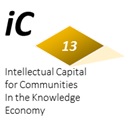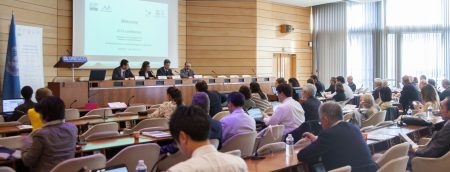 Information and Knowledge for All:
Information and Knowledge for All:
Towards an Inclusive Innovation
Organised by: The European Chair on Intellectual Capital, the University Paris-Sud
July 3 & 4 2017
With a Regional Focus
JAPAN
Venue : UNESCO Headquarters
7 Place de Fontenoy , 75007, Paris
(Rooms IV & 7)

The central theme of the 13th Edition of the World Intellectual Capital (IC) Conference is “Information and Knowledge for All: Towards An Inclusive Innovation”. The topic of this year is largely justified by the increasing gap in revenues distribution at the global level. Hence among others the development of the concept of “inclusive Innovation”, generally defined as the innovation supplied by a group of people- generally low-income- excluded from it (OECD 2013, Kaplinsky, 2011, Foster, Heeks, 2013). Hence the interest paid by scholars, policy makers and industry to the Base of the Economy Pyramid, a market which represents $5 trillion income segment (Aalto Global Impact). The inclusiveness concerns not only developing countries but also developed ones. Hence the issue of looking at innovation , not as a generally linear process, with stable roles for organizations and institutions, but more importantly as a way of improving living the conditions for excluded people. Inclusive innovation is therefore a way of creating / exploring new markets for products and services for people, and hence for improving their living conditions. From the policy perspective, inclusive innovation might raise several conflicting issues, especially with regards to the fairness in distribution of income and growth, job creation and competitiveness, growth maximization and equity considerations (Mohnen & Stare). From the business perspective, innovation inclusiveness opens the way for considering the issue of innovation from the new perspective: creating new markets, developing new learning and ideas, and bridging local resources with global ones. From the societal perspective, the development of societal innovation approaches and practices, attests to the limits of the traditional organizational- centric approach, and to the growing role of society as a hub for innovation. These approaches open new spaces for ideas, information circulation and social links.
Conference report and speakers’ slides
DOWNLOAD THE CONFERENCE REPORT
Download the speakers’ slides below.
Session 1
- “Antecedents and Future Directions- UNESCO Perspectives”, Indrajit Banerjee, UNESCO
(speech – no slides available) - “Digital Innovation and the Distribution of Income”, Dominique Guellec, OECD
- “Inclusive innovation : the World bank perspective”, Natalia Agapitova, the World Bank
- “Inclusive Innovation Policies: Lessons from International Case Studies”, Andrés Barreneche Garcia & Sandra Planes Satorra, OECD
- “Including Citizens in Science and Research”, Daniel Wyler, University of Zürich
Session 2
- “How IFAP Priorities contribute to policy agenda of Member States” , Chafica Haddad, IFAP (speech – no slides available)
- “Culture, Innovation, Inclusiveness”, Jean-Éric Aubert, Former Lead Specialist, The World Bank
- “Football is More: What the Business World can Learn from CSR Initiatives in Professional Football“Stefan Güldenberg, University of Liechtenstein
- “Inclusive and Frugal Innovation in Emerging Markets”, Jaideep Prabhu, University of Cambridge
Session 3
- “Realization of hhc mission through our business activities based on Knowledge Creation Theory”, Chihiro Takayama, Executive Director, Eisai Co., Ltd.
- « 3M value creation process » Hisao Kumakura, Manager, 3M Japan Limited.
- “Integrated reporting and value creation in Japan”, Yoshiko Shibasaka, partner, KPMG Japan
- “Introduction of tools for better dialogues between company and investor”, Shinpei Goto, Deputy Director, IPR Office, Ministry of Economy, Trade and Industry (METI)
- “How to utilize IC information for investment”, Tatsuo Nakamura, President, Valuenex
Session 4
- “Intangibles and the Japanese Economy”, Tsutomu Miyagawa, Gakushuin University
- “Harmony between AI and Job”, Etona Ueda, Nomura Research Institute
- « Cool Japan », Junichiro Mimaki , Ministry of Economy, Trade and Industry (METI)
- “Overview of Candidacy for EXPO 2025, OSAKA, KANSAI,JAPAN”, Ieaki Takeda, Director, Expo Office, Ministry of Economy, Trade and Industry (METI)
- “Future Center Initiatives in Japan”, Noboru Konno, Tama University
Session 5
- “The economic impact and organisational aspects of online data analytics”, Juan Mateos-Garcia, Nesta, United Kingdom
- “Building a European data economy”, Jiri Pilar, Legal & Policy Officer, European Commission
- “Data for All as an agent for change: Experience from Egypt”, Magued Osman ,CEO,The Egyptian Center for Public Opinion Research ‘Baseera’, Former Minister of Information, Egypt
- “Micro- and macroeconomic modelling of intangible cyber-costs”, Ahmed Bounfour, Université Paris-Sud
- « Knowledge risks – the (still) underdeveloped field of research », Susanne Durst, University of Skövde
Session 6
- “Technology Transfer investments at the EIF”, Julien Baumont, European Investment Fund, Luxembourg
- “Knowledge transfer as a practice: the ASTP-Proton survey”, Marta Catarino, President, ASTP-Proton, the Netherlands
- “The knowledge transfer in the French context: an overview”, Nicolas Penet, Chairman of INSAVALOR & Board Member of Réseau CURIE
- “Technology transfer as “set of practices”: Towards a maturity model”, Laura Kreiling, Université Paris-Sud
Session 7
- “Measuring the intangible role of a Development Bank – BNDES case”, Helena Tenório Veiga de Almeida, Brazilian Development Bank, BNDES
- “Institutional Innovation and Territorial Development ”, Leif Edvinsson, The New Club of Paris
- “Institutional Capital & Territorial development“, Sarah Serval & Ahmed Bounfour, Université Paris-Sud
- “Knowledge and wealth: an overall framework”, José M. Viedma Marti, Polytechnic University of Catalonia
Session 8
- “Integrating intangibles in a stakeholder approach“, Masahiko Kon, Director, Japan Association of Corporate Executive
- “WICI Intangibles Reporting Framework“, Mariko Mishiro, CEO, Rideal Co.
- “VCDD Tree’ in integrated report“, Kimio Katsuyama, PwC Consulting, Japan
- “Reporting on Intangibles in the EU context”, Inge Wulf, TU Claustal, Germany & Pierluigi Catalfo, Università degli Studi di Catania, Italy
- “An Econophysics Value Theory: Extension of the Original Model”, Thomas J. Housel, Naval Postgraduate School, California, United States